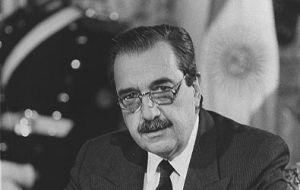MercoPress. South Atlantic News Agency
Argentina mourns the leader who paved the way to democracy in 1983
 Former President Raúl Alfonsín
Former President Raúl Alfonsín Raúl Alfonsín whose presidency marked the return of democracy to Argentina and became a beacon for change in the rest of Latinamerica scourged by an era of military dictatorships, died Tuesday evening.
The Argentine government declared three days of national mourning and the funeral has been scheduled for April 2. Thousands are expected to march to Congress to honor and pay their respects to the leader.
Alfonsín's personal doctor, Alberto Sadler, said the former president died of lung cancer. He was 82. He passed away peacefully at his Buenos Aires home surrounded by members of the family.
The presidential inauguration of the leader on 10 December 1983, ended more than seven years of a repressive military regime that left at least 12,000 disappeared. He won an open election that the military was forced to call, in disgrace after the country's defeat in the 1982 war with Britain over the Falkland Islands.
His presidency was marked by two milestones: his daring decision to bring to justice the leaders of the dictatorship for the human rights violations, and an economic collapse that made him hand power to his successor six month before his term was to end. Inflation had jumped to over 3,000% annually.
However few discussed his crucial role in the restoration of democracy at a time military regimen ruled most of South America. In Argentina he was instrumental in getting several political groups to set aside differences and unite in a loose coalition that paved the way for the 1983 election.
He garnered 51.7% of the vote, handing the powerful Peronist party its first election defeat ever. Shortly after entering the Casa Rosada presidential palace, he stunned many by ordering the trial of nine members of the former ruling military junta, on charges ranging from kidnap to torture and disappearance of thousands of people.
It was a bold step in a country where the military had dominated for decades, having taken power in six coups in the 20th century. “I think that some times I take too many risks, because what we did no one had done before,” he said later of his decision.
But he said the trials were needed to restore a strong judicial system and break the destructive cycle of political chaos and military coups that wracked Argentina for a half-century.
The “Never again” trials, unprecedented in Latin America, were conducted by a civilian court and ended in December 1985 with the conviction and imprisonment of five former military rulers, including two ex-presidents. Four others were acquitted.
Mr. Alfonsin had been ill for over a year and last August was visited by President Cristina Kirchner who praised his role in Argentine politics and wished him a quick return to full activities. “We recalled and talked about the time we were Senators. It’s always a pleasure to talk with Mr. Alfonsín”, said Mrs. Kirchner at the time. Last October he was honoured with the unveiling of a bust at the presidential palace Casa Rosada.
At the age of 20 as a law student, Alfonsin embraced politics joining the Radical party always fighting for a unified force to be able to confront the powerful Peronist movement. At 27 he was elected councillor of his home town Chascomús and later provincial and federal representative, finally reaching the presidency in 1983.
During the last Argentine military dictatorship (1976/83) he was a member of the Multiparty organization which struggled for the political return of democracy and was also very active with human rights groups.
As president he faced several military uprisings which partly mellowed his policy towards the military officers that had been involved in human rights abuses. “I did it for the sake of democracy”, he would argue.
Out of office he continued as an influential voice and opinion in Argentine politics. He helped introduce several safeguards in the constitutional review of 1994 which opened the way for the re-election of Carlos Menem.
However in 1999 he helped organize a coalition which again defeated the Peronist party. The coalition was unable to impede the meltdown of the Argentine economy, followed by default, and the resignation of former president Fernando de la Rúa in December 2001.
Together with the Peronist leader Eduardo Duhalde he again helped build a coalition which steered Argentina out the political quagmire with the 2003 election of Mr. Nestor Kirchner.
Even admitting many political errors in his career Mr. Alfonsin said he was always moved to ensure democracy in Argentina and the unity of his party.
.




Top Comments
Disclaimer & comment rulesCommenting for this story is now closed.
If you have a Facebook account, become a fan and comment on our Facebook Page!